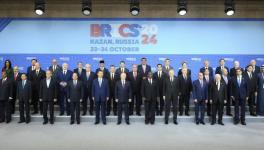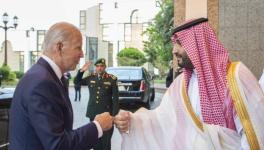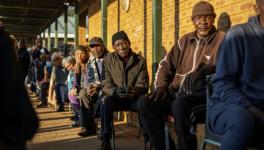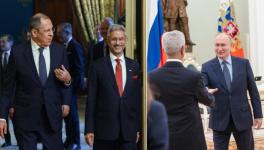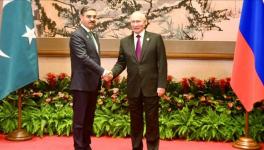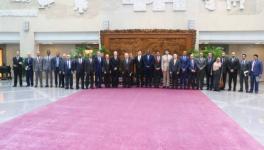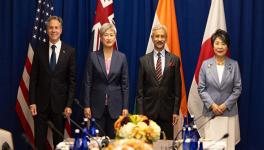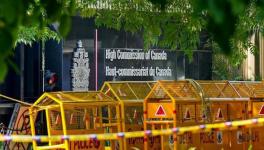Goa Declaration of the People’s Forum on BRICS
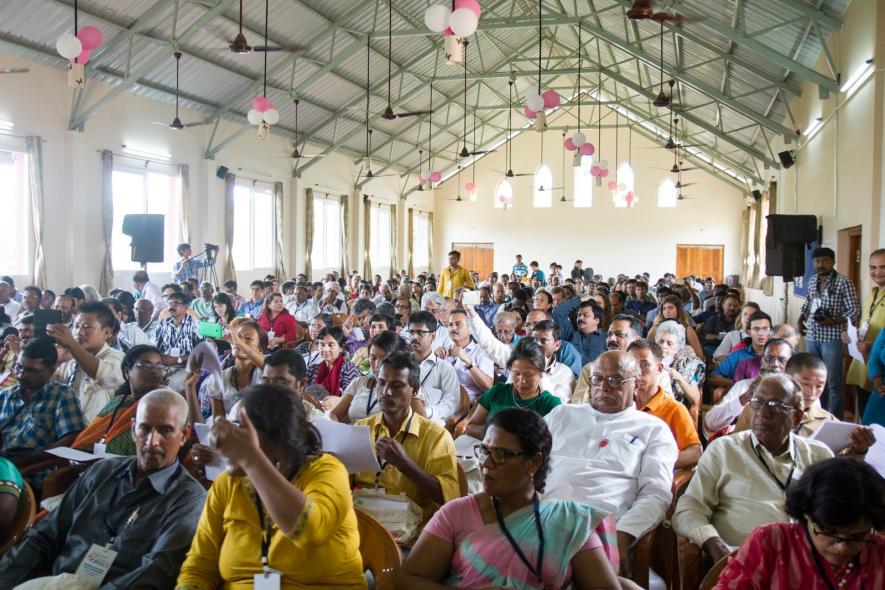
Image Courtesy: Joe Athialy
The 8th BRICS (Brazil, Russia, India, China and South Africa) Summit was held in Goa, India from 15-16 October 2016. Set up in the aftermath of the 2008 global financial crisis, the emergence of BRICS was seen as a concrete step towards constructing a multi-polar world. The People’s Forum took place just prior to the official BRICS Summit held in Goa. The state has been an active site of struggle against neo-liberalism, women’s empowerment and environmental justice. Groups from Goa along with other Indian organisations jointly hosted the event which included plenaries, self-organised workshops, cultural events and films. Several speakers recounted and emphasised on the fact that BRICS was formed to challenge the imperialistic and hegemonic nature of institutions such as the World Bank and IMF. When the five countries came together to form BRICS it was done with intent to bring about social justice and equity in these countries which are home to over 50% of the world’s population. Yet, even as the governments of these nations come together for their 8th Summit in Goa, it is a matter of serious concern that BRICS is following a path that is opposed to its foundational principles by increasingly aligning with capitalist and imperialist’s forces of the world.
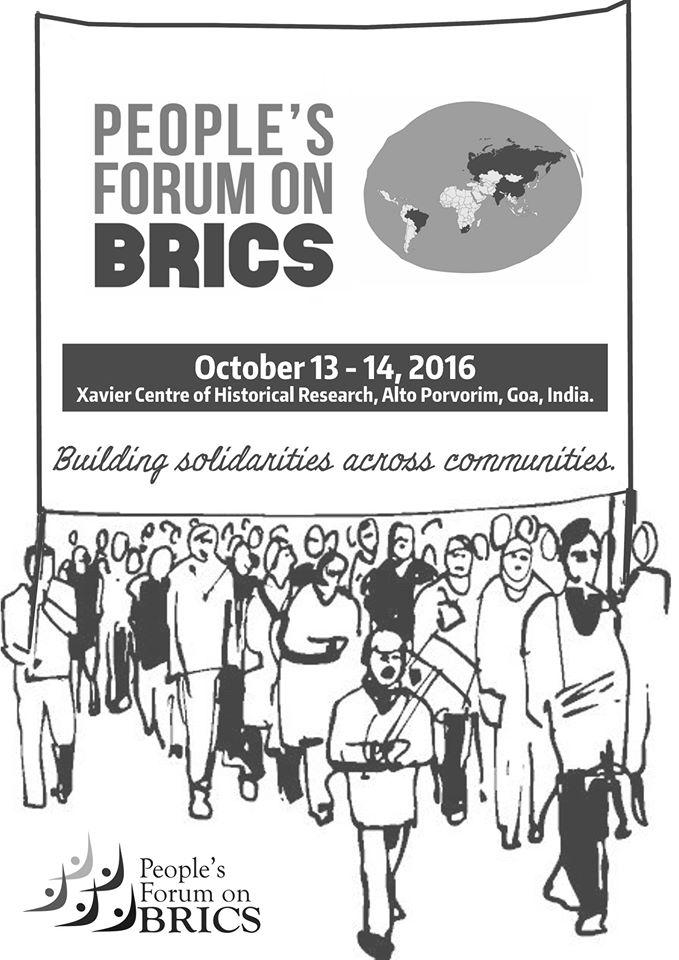
The finalised Goa Declaration of the People's forum on BRICS was released on 14th of October. It analyses the serious issues that concern the BRICS countries:
- Democracy is under threat, as the illegitimate Brazilian ‘President’ Michel Temer’s presence reminds us, along with attacks on democratic space in the other BRICS;
- State repression is rising, such as in India where movements’ dissent is met with brutal repression, and in South Africa where university students have been brutally victimised by local police in recent days;
- Ecological destruction is widespread, with catastrophic rates of species loss, pollution of land and air, freshwater and ocean degradation, and public health threats rising, to which no BRICS country is immune;
- In particular, climate change is already having disastrous effects –for example, in India and Southern Africa where large regions face extreme drought – with no relief expected from the Paris COP21 agreement in which negotiators regrettably agreed to non-binding commitments that benefit mainly the North and the BRICS corporations;
- The world economy is teetering on the brink of a financial meltdown, reflected in the chaos that several BRICS’ stock and currency markets have been facing, as well as in our countries’ vulnerability to crisis-contagion if major European banks soon fail in a manner similar to the US-catalysed meltdown in 2008-09;
- The longer-term crisis of capitalism is evident in the marked slowdown in international trade and in declining global profit rates, especially evident in the three BRICS countries (South Africa, Russia and Brazil) which have negative or negligible GDP growth;
- In addition to commodity crashes, one cause of the economic crisis is the deregulatory, neoliberal philosophy adopted by BRICS governments, which puts corporate property rights above human and environmental rights; in the guise of development
- In the World Trade Organisation, BRICS’ contributions to negotiations were disastrous in the latest round, where food sovereignty was lost because India and Brazil joined the US and EU to reinforce liberalisation;
- The new generation of Bilateral Trade and Investment Treaties will potentially have adverse impacts on lives and livelihoods of people across the BRICS and their hinterlands, and need complete rethinking.
- The world’s workers are losing rights, farmers are suffering to the point of suicide, and labour casualisation is rampant in all our countries, with the result that BRICS workers are engaged in regular protest, including the strike by 180 million Indian workers which inspired the world on 2 September 2016;
- On the social front, the threat to our already-inadequate welfare policies is serious, especially in Brazil’s coup regime but also across the BRICS where inadequate social policies are driving people on the margins to destitution;
- The commodification and privatisation of public services is causing misery, such as in South Africa where university students are fighting hard for a fee-free, decolonised tertiary education;
- Patriarchy and sexual violence, racism, communalism, caste discrimination, xenophobia and homophobia run rampant in all the BRICS, and because these forces serve our leaders’ interests, they are not addressing the structural causes, perpetuating divide-and-rule politics, and failing to dissuade ordinary people from contributing to oppression;
- Unsustainable energy options such as nuclear power and large infrastructure projects are being undemocratically pushed in BRICS countries. The spirited resistance from peoples movements is being met with brutal repression of those fighting against land appropriation, loss of livelihoods and environmental and health hazards
- The destructive arms trade is rampant in the BRICS, such as India’s with Israel, or South Africa’s notorious corrupting arms deal with Northern firms; and
- The whole world is concerned about geopolitical tensions in West Asia, the Democratic Republic of the Congo and Haiti.
Whether or not these crises are resolved in coming decades, or degenerate into full-blown catastrophes, the BRICS governments and peoples will be central to most, if not all. The need for our popular movements to focus on how the BRICS as a bloc contribute to these global problems or could address these, and to combine our forces across borders, is the reason the People’s Forum was convened. Everywhere that people’s movements have made alternative demands – such as democracy, peace, poverty eradication, sustainable development, equality, fair trade, climate justice – the elites have co-opted our language and distorted our visions beyond recognition.
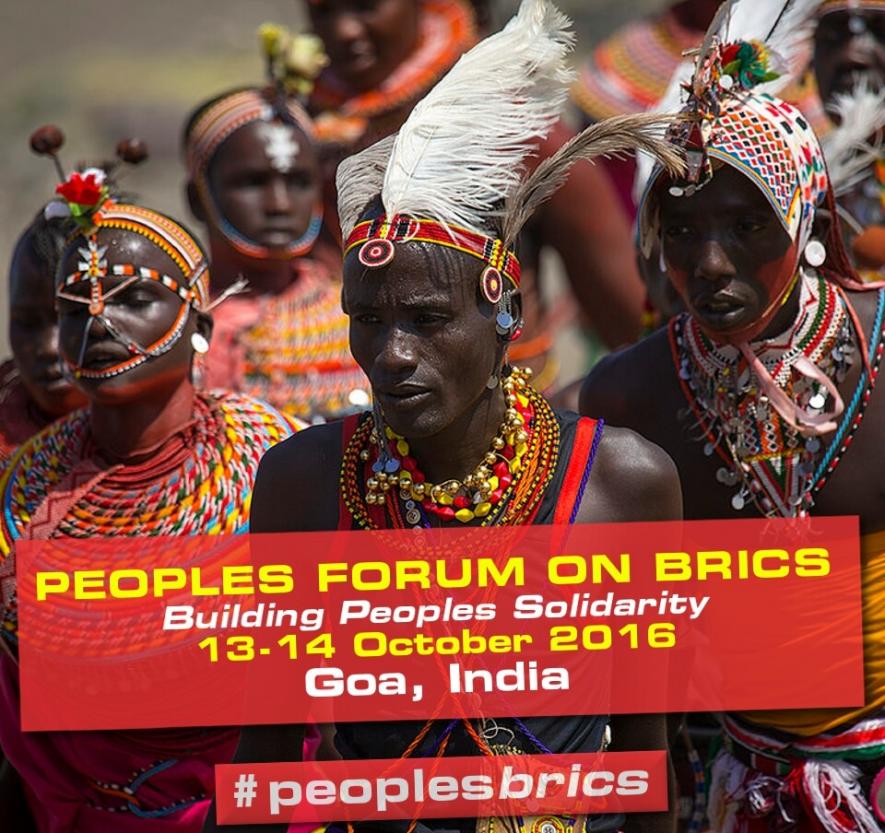
While we criticise the way world power is created and exercised, the BRICS leaders appear to simply want power sharing and a seat at the high table. For example, the BRICS New Development Bank is working hand-in-glove with the World Bank; the Contingent Reserve Arrangement empowers the International Monetary Fund; and the Asian Infrastructure Investment Bank serves mainly corporate interests – and all these financial institutions, despite their rhetoric of transformation, are opaque and un-transparent to people in BRICS countries, with no accountability mechanisms or space for meaningful participation by our movements. Negative trends in the areas of global and local politics, and on issues of economics, environment, development, peace, conflict and aggressive nationalism, or social prejudice based on gender, race, caste, sexual orientation are not being reversed by the BRICS, but instead are often exacerbated. The BRICS speak of offering strong alternatives to the unfair North-dominated regimes of trade, finance, investment and property rights, climate governance, and other multilateral regimes. But on examination, the forum found these claims unconvincing.
The People’s Forum raised constructive critiques of BRICS in their plenaries and workshops. But beyond the analysis, they feel that only people’s power and activism, across borders can make change. This Forum found many routes forward for cross-cutting BRICS internationalism on various issues. The forum intends to win their demands for social, economic and environmental justice. In 2017 and beyond, the BRICS People’s Forum will reconvene, and redouble their efforts with new-found allies and united transcontinental movements in solidarity and struggle from Brazil, Russia, India, China and South Africa.
Get the latest reports & analysis with people's perspective on Protests, movements & deep analytical videos, discussions of the current affairs in your Telegram app. Subscribe to NewsClick's Telegram channel & get Real-Time updates on stories, as they get published on our website.











